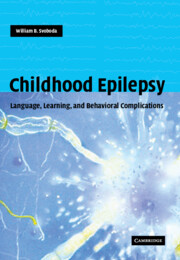Book contents
- Frontmatter
- Contents
- Preface
- Glossary
- 1 Looking ahead
- Part I Speech and language problems
- Part II Learning problems
- 12 Learning challenges
- 13 The development of learning
- 14 Learning difficulties
- 15 Learning problems with seizure types
- 16 Modifying factors
- 17 Transient cognitive impairments of epilepsy
- 18 Attention and alertness
- 19 Memory
- 20 Executive functioning
- 21 Academics
- 22 Antiepileptic medication effects
- 23 Effects of other therapies
- 24 Diagnosis
- 25 Gaining help
- 26 Frustrations of learning problems
- Part III Behavior problems
- Index
- References
24 - Diagnosis
from Part II - Learning problems
Published online by Cambridge University Press: 26 October 2009
- Frontmatter
- Contents
- Preface
- Glossary
- 1 Looking ahead
- Part I Speech and language problems
- Part II Learning problems
- 12 Learning challenges
- 13 The development of learning
- 14 Learning difficulties
- 15 Learning problems with seizure types
- 16 Modifying factors
- 17 Transient cognitive impairments of epilepsy
- 18 Attention and alertness
- 19 Memory
- 20 Executive functioning
- 21 Academics
- 22 Antiepileptic medication effects
- 23 Effects of other therapies
- 24 Diagnosis
- 25 Gaining help
- 26 Frustrations of learning problems
- Part III Behavior problems
- Index
- References
Summary
Children with epilepsy are at risk for learning problems. Cognitive impairment is the link between epilepsy and the inability to learn in school (Aldenkamp et al., 1990). Epilepsy may cause dysfunction of a given specific performance that coincides with the cortical area involved, without causing mental retardation. When cognitive performance has not definitely been acquired, a dysfunction in a specific cognitive performance may cause an imbalance of the complex system of cognitive development. True mental retardation may improve if the specific cognitive dysfunction is treated adequately early (Cornaggia & Gobbi, 2001).
A proper assessment of the complex situation is difficult, requiring the collaboration of physician, psychologist, teacher, and family. The child should at least be screened, even if not evaluated formally, using appropriate observations and tests as part of the initial evaluation and in follow-up, especially if the history and/or school reports indicate possible problems. Children with difficult seizure problems and learning difficulties may need to be referred to a specialized epilepsy center to insure the best possible assessment. Although most children with epilepsy benefit from medication, excessive medication may cause learning difficulties even in a well-functioning child with benign absence seizures (Henricksen, 1990). For some patients with medication-resistant seizures, earlier surgery may be beneficial and may prevent the learning and social handicaps that may otherwise emerge.
Early signs of learning disabilities
In children with inherited learning disabilities and with very early-onset seizures that lead to later learning disabilities, there may be early signs suggestive of later learning disabilities (Svoboda, 1979).
- Type
- Chapter
- Information
- Childhood EpilepsyLanguage, Learning and Behavioural Complications, pp. 375 - 385Publisher: Cambridge University PressPrint publication year: 2004



